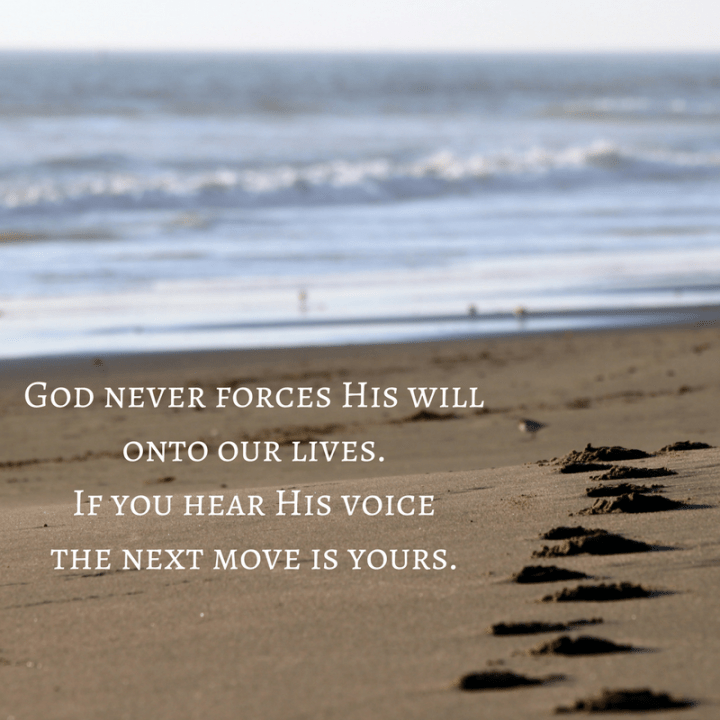
God created each of us with a specific ministry assignment in mind. While our assignments are as diverse and creative as He is, they share a common goal of drawing people into a life-transforming, life-saving relationship with Jesus. (Ephesians 2:10)
As the body of Christ we are called to embrace and fulfill our assignments. (1 Corinthians 12:12-27) As we are faithful in small things, God will grow our ministries (but also our burdens). (Matthew 25:14-30)
I am reading Exodus, and was struck by five traits Moses modeled in his response to God’s call.
1. Be Present
Moses was tending sheep, having led them to “far side of the wilderness,” a remote location where he no doubt expected to be isolated and alone. God shows up at the most unexpected places and times in our lives.
When God first grabs Moses’ attention it is as a curiosity, a bush burning without being consumed. Moses is attracted to the spectacle, without recognizing its source.
God calls to him by name: “Moses, Moses!”
“Here I am,” Moses replies.
When we hear God’s call the first step is to recognize and acknowledge Him.
2. Trust
It’s not until Moses makes the first move to go over to look at the burning bush that God calls out to him. (Exodus 3:4) Throughout Scripture God waits for His people to take the first step:
- Abraham displays trust in God’s character before God stays his hand from sacrificing his son, Isaac. (Genesis 22)
- The Israelites step into the Red Sea before God parts it. (Exodus 14:15)
- God stops the Jordan River for the Israelites to cross “as soon as the priests’ feet touched the water’s edge.” (Joshua 3)
- And Jesus tells Peter to step out of the boat first, “Come.” (Matthew 14: 22-34)
God always waits for us to take the first step; it’s an implicit part of free will.
God wastes no time after telling Moses of His plan to free His people; He directs him, “So now, go.” (Exodus 3:10)

3. Repent
As soon as Moses realizes he is in the presence of God he is overcome by his own sinfulness. He hides his face and is afraid to look at God. (Exodus 3:6)
In fact, Moses doesn’t even reach his appointment before God deems him to be nearly dead in sin, having failed to circumcise his son–part of the covenantal promise of the people he is being called to lead. He is surprised by his own sin. God does not promise that following Him will be easy or enjoyable.
If anyone wishes to come after Me, he must deny himself, and take up his cross daily and follow Me.
If we accept a role of leading others we also must submit to a new level of God’s refinement. James acknowledges this difference in standards. (James 3:1)
Since all have sinned and fall short of the glory of God (Romans 3:23), God uses our ministries to refine our hearts first. Ever mindful of our sinfulness, we then can be humble and faithful in pointing to Him as the source of the good others see in us. (Matthew 5:16)
As we step into our ministry assignments it is important to continually and actively repent as a spiritual discipline, prayerfully inviting the Lord’s refinement:
Search me, O God, and know my heart;
Try me and know my anxious thoughts;
And see if there be any hurtful way in me,
And lead me in the everlasting way.
4. Implore God
Moses had a wife, family and a decent living working for his father-in-law. God was asking him to drop everything for what seemed like a fool’s errand: Demand that Pharaoh free the Israelites, the same Pharaoh from whom he was a fugitive for murder. And, oh by the way, the promised land flowing with milk and honey was also occupied…by some of the Israelites’ fiercest enemies.
We all have lots of great-sounding reasons to delay and defer on our assignments.
Moses took his concerns to God honestly and openly:
First, he questioned if there might be a more qualified messenger. God simply reminds Moses (and us): “I will be with you.”
Next, he frets that, as a disenfranchised Hebrew, his brethren may not believe that he speaks for their God. God doesn’t choose the holiest among us; He tends to choose the lowliest. It’s about displaying His power and goodness, not ours.
“But what if they don’t believe me?” Moses asks. (Anyone whispering an “Amen” here?) God is sending Moses back to a people who never accepted him as one of their own. Jesus acknowledged this challenge at the start of his public ministry: “Truly I say to you, no prophet is welcome in his hometown.” (Luke 4:24)
Finally, Moses laments being asked to serve in his area of greatest weakness. “Please, Lord, I have never been eloquent, neither recently nor in time past, nor since You have spoken to Your servant; for I am slow of speech and slow of tongue.” (Exodus 4:10) God shows tremendous grace to this reluctant servant, enlisting his brother, Aaron, to help.
Fortunately, we serve a relational God who designed us to strengthen and support one another; we should not be afraid to ask for support.
5. Obey
In the end, Moses obeys God’s call at ever-greater levels with each step he takes.
He quickly departs on a journey with no clear outcome. He trusts that God will be with him, provide for his needs, and use him to bring freedom to others.
If you are awaiting God’s call on your life, preparing for a new ministry or in the midst of a tumultuous one now, remember and embrace Moses’ model for ministry:
